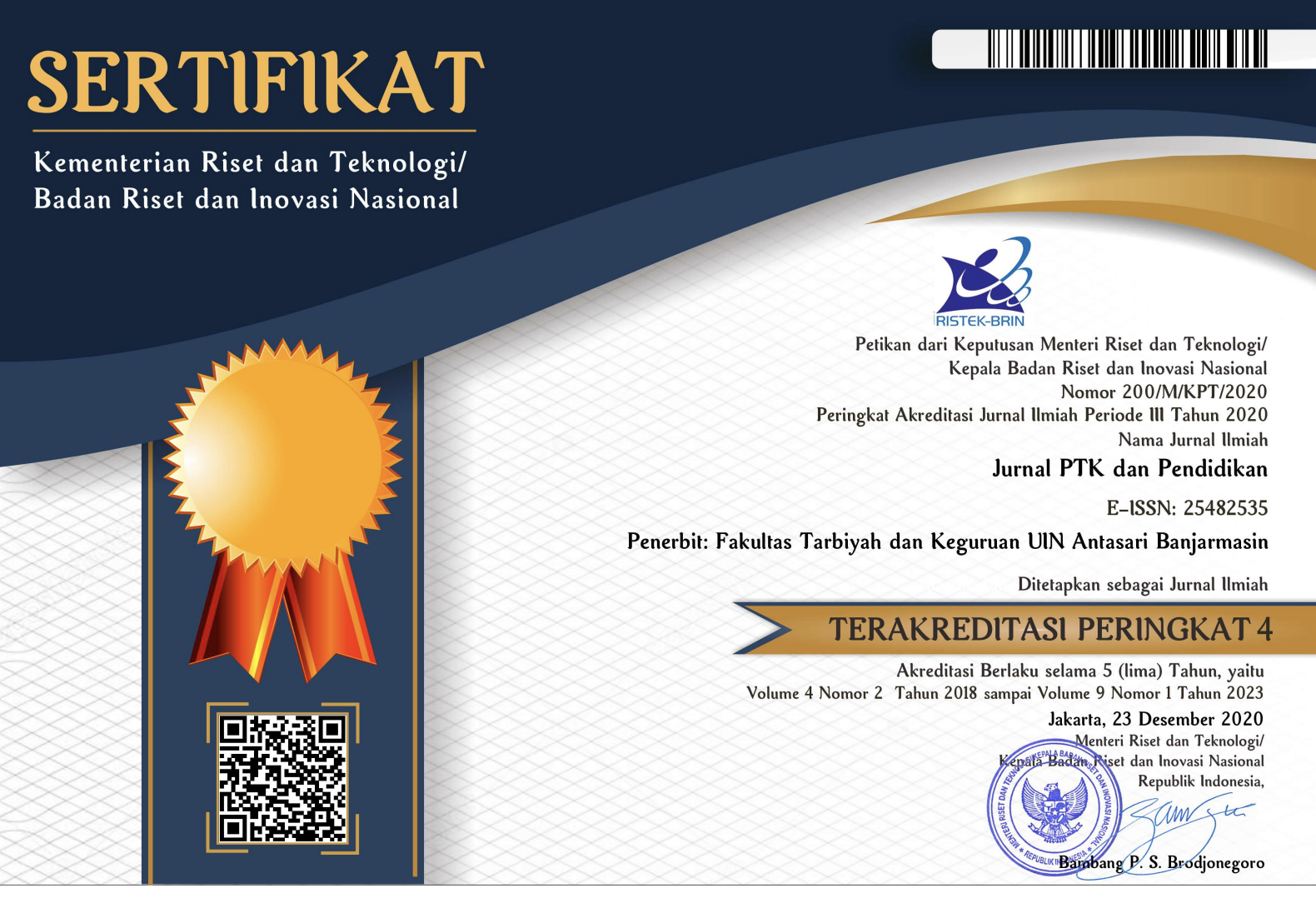ENHANCING STUDENTS’ MOTIVATION IN ENGLISH LANGUAGE LEARNING THROUGH GAMIFICATION
DOI:
https://doi.org/10.18592/ptk.v9i2.11080Abstract
One of the contributing factors to the students' limited English proficiency can be attributed to the teacher's insufficient emphasis on fostering students’ motivation throughout the learning journey. The purpose of this research is to identify the initial factors influencing students' motivation to learn English, as well as to investigate the potential of gamification in increasing their motivation to study the language. The current study is a class action research that was carried out in the 8th grade of State Junior High School 1 Banyumas during the academic year 2023/2024. A dataset of observations and questionnaires administered to a cohort of 35 students is used in the study. The application of descriptive statistics is used in the data analysis process. According to research, engagement levels increased from pre-research (62% observation sheet, 68.21% questionnaire) to post-research (71.62% observation sheet, 79.36% questionnaire). Gamification has a positive impact on learners’ motivation because it increases interactivity and enjoyment in the learning environment. Hence, gamification can be a viable approach to increasing learners' motivation to acquire English language proficiency.References
Alizadeh, M. (2016). The Impact of Motivation on English Language Learning. International Journal of Research in English Education, 1(1), 11–15. http://ijreeonline.com/article-1-23-en.html
Andriani, R., & Rasto. (2019). Motivasi belajar sebagai determinan hasil belajar siswa. Jurnal Pendidikan Manajemen Perkantoran, 4(1), 80–86. https://doi.org/10.17509/jpm.v4i1.14958
Anisa, K. D., Marmanto, S., & Supriyadi, S. (2020). The Effect of Gamification on Students’ Motivation in Learning English. Leksika, 14(1), 22–28. https://jurnalnasional.ump.ac.id/index.php/LEKSIKA/article/view/5695
Baptista, G., & Oliveira, T. (2019). Gamification and serious games: A literature meta-analysis and integrative model. Computers in Human Behavior, 92, 306–315. https://doi.org/10.1016/j.chb.2018.11.030
Bong, E., & Chatterjee, C. (2022) The Use of a ClassPoint Tool for Student Engagement During Online Lesson ISSN: 2186-5892 The Asian Conference on Education 2021: Official Conference Proceedings https://doi.org/10.22492/issn.2186-5892.2022.39
Bozkırlı, K. Ç., & Er, O. (2018). Investigating Teacher Views On Improving The Speaking Skills Of Syrian Students. European Journal of Education Studies, 4(6), 66–79. https://oapub.org/edu/index.php/ejes/article/view/1612/4243
Cook, D. A., & Artino, A. R. (2016). Motivation to learn: an overview of contemporary theories. Medical Education, 50, 997–1014. https://doi.org/10.1111%2Fmedu.13074
Daif-Allah, A. S., & Aljumah, F. H. (2020). Differences in Motivation to Learning English among Saudi University Students. English Language Teaching, 13(2), 63–74. https://doi.org/10.5539/elt.v13n2p63
Deterding, S., Dixon, D., Khaled, R., Nacke. L. (2011, September). From game design elements to gamefulness: defining gamification. In: Proceedings of the 15th International Academic MindTrek Conference: Envisioning Future Media Environments, New York, USA (pp. 9–15). Association for Computing Machinery.
Emda, A. (2017). Kedudukan Motivasi Belajar Siswa dalam Pembelajaran. Lantanida Journal, 5(2), 93–196. http://dx.doi.org/10.22373/lj.v5i2.2838
Glover, I. (2013) Play as You Learn: Gamification as a Technique for Motivating Learners. In: Herrington, J., Couros, A. and Irvine, V., Eds., Proceedings of World Conference on Educational Multimedia, Hypermedia and Telecommunications, AACE, Chesapeake (pp. 1999-2008). http://shura.shu.ac.uk/7172/
Hamari, J., Koivisto, J., & Sarsa, H. (2014, January). Does Gamification Work?—A Literature Review of Empirical Studies on Gamification. 2014 47th Hawaii International Conference on System Sciences, Waikoloa, HI (pp. 3025-3034). https://doi.org/10.1109/HICSS.2014.377
Jusuf, H. (2016). Penggunaan Gamifikasi dalam Proses Pembelajaran. Jurnal TICOM, 5(1), 1–6. https://media.neliti.com/media/publications/92772-ID-penggunaan-gamifikasi-dalam-proses-pembe.pdf
Kapp, K. M. (2012). The Gamification of Learning and Instruction: Game-based Methods and Strategies for Training and Education. San Fransisco: Pfeiffer.
Kompri. (2016). Motivasi Pembelajaran Perspektif Guru dan Siswa. Bandung: PT Rosda Karya.
Koshy, V. (2005). Action Research for Improving Practice: A Practical Guide. London: Paul Chapman Publishing.
Li, K.-C., Chen, C.-T., Cheng, S.-Y., & Tsai, C.-W. (2016). The Design of Immersive English Learning Environment Using Augmented Reality. Universal Journal of Educational Research, 4(9), 2076–2083. https://doi.org/10.13189/ujer.2016.040919
Liao, Y.-W., Huang, Y.-M., & Wang, Y.-S. (2015). Factors Affecting Students’ Continued Usage Intention Toward Business Simulation Games: An Empirical Study. Journal of Educational Computing Research, 53(2), 260–283. https://doi.org/10.1177/0735633115598751
McNiff, J. (2016). Writing Up Your Action Research Project. London: Routledge.
Millis, K., Forsyth, C., Wallace, P., Graesser, A. C., & Timmins, G. (2016). The Impact of Game-Like Features on Learning from an Intelligent Tutoring System. Technology, Knowledge and Learning, 22(1), 1–22. https://doi.org/10.1007/s10758-016-9289-5
Monika, & Adman. (2017). Peran Efikasi Diri Dan Motivasi Belajar Dalam Meningkatkan Hasil Belajar Siswa Sekolah Menengah Kejuruan. Jurnal Pendidikan Manajemen Perkantoran, 2(2), 219–226. https://doi.org/10.17509/jpm.v2i2.8111
Sundqvist, P., & Wikstrom, P. (2015). Out-of-school digital gameplay and in-school L2 English vocabulary outcomes. System, 51, 65–76. https://doi.org/10.1016/j.system.2015.04.001
Suwartono. (2014). Dasar-Dasar Metodologi Penelitian. Yogyakarta: ANDI.
Thohir, L. (2017). Motivation in a Foreign Language Teaching and Learning. Jurnal Vision, 6(1), 33–46. https://doi.org/10.21580/vjv6i11580
Tsymbal, S. (2018). Gamified Training Sessions as Means of Enhancing Students’ Motivation in Learning English. Psychological Journal, 7(17). https://doi.org/10.31108/1.2018.7.17.10
Tu, S., & Zhou, Y. (2015). A Study on the Relationship between Motivation and Interpretation Competence of English Majors. International Journal of Business and Social Science, 6(7), 21–221. https://ijbssnet.com/journals/Vol_6_No_7_July_2015/22.pdf
Vianna, Y., Vianna, M., Medina, B., & Tanaka, S. (2014). Gamification, Inc. - Recreating Companies Through Games. Rio de Janeiro: MJV Press.
Yilmaz, E., Şahin, M., & Turgut, M. (2017). Variables Affecting Student Motivation Based on Academic Publications. Journal of Education and Practice, 8(12), 112–120. https://www.iiste.org/Journals/index.php/JEP/article/view/36572
Downloads
Published
How to Cite
Issue
Section
License
Copyright (c) 2024 Denta Naviantara, Tono SUWARTONO, Yaomal Romdona

This work is licensed under a Creative Commons Attribution 4.0 International License.
- The right to publication of all journal material published on the Jurnal PTK dan Pendidikan website is held by the editorial board with the author's knowledge (moral rights remain the property of the author).
- The formal legal provisions for access to digital articles of this electronic journal are subject to the terms of the Creative Commons CC BY 4.0 DEED Attribution International (CC BY) license. This license enables reusers to distribute, remix, adapt, and build upon the material in any medium or format, so long as attribution is given to the creator. The license allows for commercial use.
- Printed and electronic published manuscripts are open access for educational, research and library purposes. In addition to these objectives, the editorial board shall not be liable for violations of copyright law.






